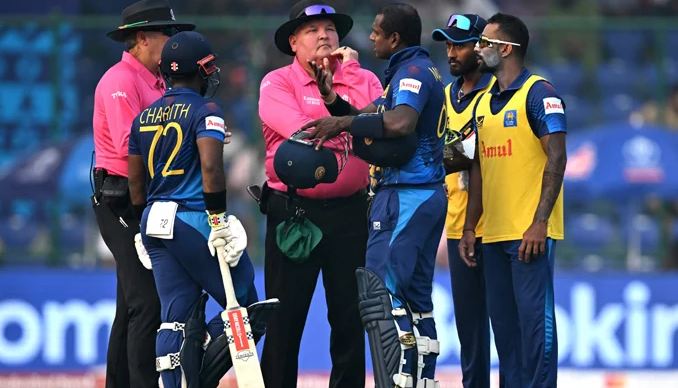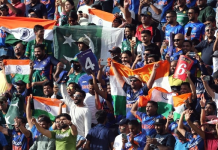Delhi, NOV 6: Angelo Mathews made history on a Monday in Delhi, but not in a way he would have ever imagined. During the ICC World Cup 2023 match against Bangladesh, Mathews found himself in an unusual situation, becoming the first-ever batter to be timed out in international cricket. It was an extraordinary turn of events that left cricket fans and experts scratching their heads.
In cricket, when a batter is dismissed, the rules state that the incoming batsman should be prepared to face a delivery within two minutes of the fall of the wicket. However, on this fateful day, Mathews failed to adhere to this fundamental requirement.
Mathews, eager to take his stance at the crease, faced an unexpected hurdle when the strap of his helmet suddenly snapped. In a sport where timing and readiness are crucial, this was an unfortunate and rare setback. The former Sri Lankan captain swiftly requested a new helmet to replace the damaged one.
As Mathews waited for the replacement helmet to arrive, Shakib, the Bangladeshi bowler, saw an opportunity and appealed to the umpires, claiming that Mathews was delaying the game. To the astonishment of everyone, the umpires accepted Shakib’s appeal, and Mathews was declared timed out. This was a moment of cricketing history, and Mathews had unwittingly etched his name into the annals of the game as the first batter to be timed out.
But the drama didn’t end there. The backdrop to this historic incident was the alarming air quality in Delhi. The city, where the match was being played, had been grappling with severe pollution, making it the most polluted major city on the planet. The air quality in Delhi had oscillated between “poor” and “severe” in the days leading up to the game.
The hazardous smog had forced some players and coaches from both teams to don face masks during their training sessions at the Arun Jaitley Stadium. These precautions were deemed necessary, particularly for those with asthma, as the polluted air posed serious health risks.
During the early stages of the Sri Lankan innings, the levels of the most dangerous PM2.5 particles in the air measured a staggering 184 micrograms per cubic meter, according to IQAir. This level was over twelve times higher than the daily maximum recommended by the World Health Organization, underscoring the severity of the pollution crisis in Delhi.
The International Cricket Council (ICC) guidelines usually assess air quality as they would other weather-related factors. The safety and well-being of the players and officials are paramount. This wasn’t the first time pollution had disrupted a cricket match in Delhi. In December 2017, during a Test match, Sri Lankan players had come out wearing masks after the tea break due to the severe pollution. Indian bowler Mohammed Shami had even vomited on the pitch, highlighting the adverse effects of playing in such conditions.
In the end, Angelo Mathews’ unusual timing out will be remembered as a peculiar footnote in the history of cricket, forever associated with the challenges posed by Delhi’s severe air pollution. It serves as a stark reminder that the environmental conditions in which sporting events take place can sometimes be as significant as the events themselves, impacting the players and the course of the game.

















